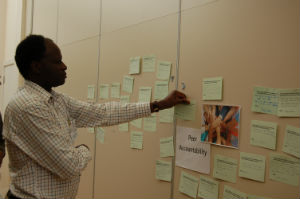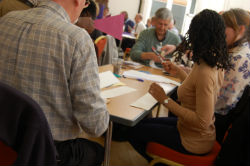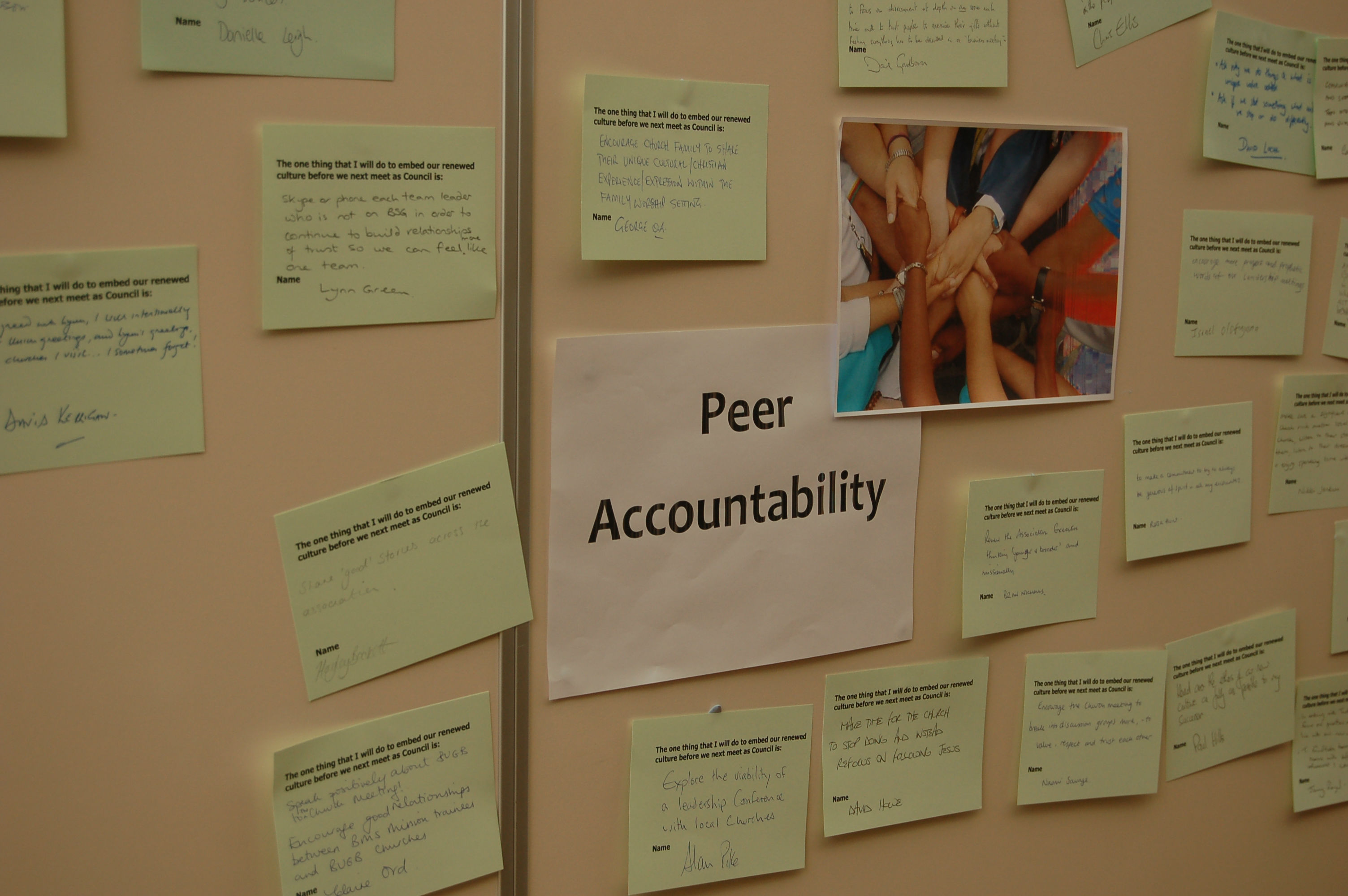Baptist Union Council: March 2014 report
A report of the Baptist Union Council at the Hayes Conference Centre in Swanwick, 19-20 March

How to embody the renewed culture of our Union, further work on its priorities and strategy, and a presentation on pioneering mission all featured at the latest gathering of the Baptist Union Council. Ministerial Recognition rules, an update on the review of Ministerial selection and formation, the election of new trustees, and the continuing conversation around sexuality were also agenda items.
For the first time a
Council Facebook group was created, enabling people to feed their thoughts into the discussions, ask questions and interact with Council members. By the end 350 people had joined the group.
This was the second time Council had met in its new form with a much smaller and revised membership, and reduced business content. Moderator the Revd Sheila Martin reminded everyone that the two-day gathering was a time of listening to God, ‘so we can discern the strategic direction God wants us to move in.’
General Secretary the Revd Lynn Green shared some thoughts on Ezekiel 37: 1-14, and her sense that this passage was ‘speaking to our life as a Union’. The bones were arid and they had been there for years, but God asks, ‘Can these bones live?’
Caught between faith and reality Ezekiel showed ‘obedience and responsiveness’, even though it looked impossible, and prophesied as God asked him to. This is the first act of the drama, said Lynn.
The bones then come together, but they have no life, at which point the second act in the drama then takes place. God says "prophesy to the breath". Once again Ezekiel was obedient, and the bones found life as a vast army.
Relating the themes of the passage to our Baptist Union of Great Britain, Lynn said that our first movement must be to speak the word of the Lord – ‘to speak to the bones of covenant, connectedness, hope and future’. ‘Words are powerful,’ she continued, ‘we need to share the vision of how we believe God wants to shape us - God is giving us a shape. He is joining us together.’
But we need more than words, she continued. ‘It’s not enough just to create new structures, we need the Spirit of God; God’s breath.’
Culture
Wednesday morning and early afternoon were spent looking at aspects of the renewed culture that we want to develop as a Union. Significant work has been done by Council, the Cultures Group and the Steering Group to help articulate this culture, and a document outlining this was shared:
We believe that we must intentionally develop a culture where we...
-
Seek to be a movement of Spirit led communities. As those who have encountered the living Christ, to intentionally seek his will and purpose for our local churches and every expression of our shared life. (Galatians 5:22-25)
-
Feel like one team – celebrating diversity; valuing, respecting and trusting each other as we work together in partnerships - making sure everyone feels included and listened to. (I Corinthians 12:24b-27)
-
Embrace adventure – being serious about discipleship, willing to take risks, pioneer and move out of the comfort zone of familiar ways of doing things. (Matthew 28:18-20)
-
Inspire others – with a generosity of spirit, energise and motivate people to be all that God created them to be. (Ephesians 5:1 & 2)
-
Share a Hunger for God’s coming Kingdom – nurturing a “holy discontent” that arises from our desire to give practical expression to our vision of God’s purpose for creation - confronting evil, injustice and hypocrisy and challenging worldly attitudes to power, wealth, status and security both within and beyond our Union. (Matthew 6:9 & 10)
The document stated that this expression of our culture must not remain ‘merely words on a page.’ ‘If it does we will have failed.’
It continued: ‘Rather, we must now move on to consider how we embody this culture and make it real and we will use some of our time together as Council to begin this work.’

In what was the first in series of discussions around tables (reflecting the desire to make Council a space for listening and discerning) Council members were asked to explore a series of questions together:
Where do you see our new culture already present?
What would need to happen for our renewed culture to become real in your setting? What would you need to change and prioritise?
The final question was: what are You going to do about embedding this culture?
Those gathered were encouraged to make a commitment to what they would do personally to achieve this by the next Council. Everyone was given two sheets paper onto which to write their pledge: one to be taken away, the other attached to a ‘peer accountability wall’ where it will be looked at next time Council meets. The question was also posed on Facebook: is making such a commitment something we can all do?
Priorities and strategy
One of Council’s tasks is to discern broad strategy for our Union, and work was done on this on Thursday morning. Lynn reminded how the overarching vision of our Union following the Futures process was “Growing healthy churches in relationship for God’s mission.”
At November’s Council, the following priorities had been identified:
Equipping leaders
Engaging with communities
Interdependence
Pruning/being willing to bring things to an end
Rest
Taking risks/pioneering
Justice

At their tables Council members were asked to choose one of these priorities, and discuss:
What would it look like if we’d achieved this priority?
Following this the question became: what are you already doing on this priority?
Then: is this enough to get us where we want to be?
The comments were all captured, some posted on the peer accountability wall and will be fed back to the Baptist Steering Group. This session also saw much activity on Facebook, which was shared on the big screen.
Finances
Updates were given to our Union’s finances by treasurer Malcolm Broad and David Locke, the Support Services team leader. Malcolm shared how accounts were healthier than they had been: 2013 had seen a net surplus of £285,000 (£160,000 more than had been budgeted for). He described it as ‘an extremely good result in very difficult circumstances’. 2013 was a year of transition which included staff reduction and a period of going into the unknown. Although giving to Home Mission in 2013 was slightly down, legacy and investment income had exceeded expectations. Malcolm paid tribute to staff at Baptist House and among Associations for absorbing the change. He was re-elected treasurer.
David shared how there had been a promising start to Home Mission giving to 2014 – it was above target for January and February. It was also announced that David, who had been on secondment from BMS World Mission for the last 18 months, is to move permanently as the Team Leader of Shared Services, and there was a warm appreciation both for his work at BMS and his contribution to our Union.
Sexuality
The Revd Stephen Keyworth presented an update on our Baptist responses to sexuality and relationships, especially in the light of the government introducing the Marriage (Same Sex) Bill 2013.
With the first same-sex marriages will take place on 29 March, Stephen once again stressed that Baptist churches will not be forced to conduct same-sex ceremonies. The process involves registering their building to ‘opt-in’. The registration currently held for a building is not sufficient. If they do not opt in, they will not be allowed in law to conduct same sex ceremonies.
Churches can only do so if their appropriate religious authority gives them written permission. For Baptists, this can only be the local church meeting, and this has been established in law. ‘The Government knows that when it deals with Baptists in this way it has to deal with 2000 of us,’ said Stephen. ‘That pleased them no end!’
Stephen predicted a lot of media activity at the end of March and expressed his hope that we will be able to rise above the agenda of the tabloid press, which would seek to place the church 'in a poor light, out of touch with justice and fairness'. He said he had been impressed with the serious level of engagement through Scripture and the gracious way the conversations had been conducted around the issue of sexuality and relationships.
He shared a straw poll which he thought to be indicative of our Union. People were asked for their personal position about the blessing of same-sex relationships and then to place themselves on a scale between the two extremes of: no, not never, ever…. and yes, I can’t understand why we’re not doing it now. He said there were two peaks: “No, I can’t see that I would, but accept that others do…”, and “Yes, I don’t see a problem, but accept that others think differently.” Those at either extreme were small in number. Stephen continued, ‘In my experience in this role…. this mirrors precisely the attitudes which are present in our Union.’
A statement was shared, put together by the Baptist Steering Group, which tried to express an overview of where Baptists are in relation to the Marriage (Same Sex Couples) Act 2013. Gracious, spirit-filled and helpful consideration was given to this and there was a good measure of consensus. It has returned to the Baptist Steering Group, which meets next week. The BSG will be prayerfully reflecting further as part of the ongoing discussion.
Ministerial Recognition Rules
On Wednesday a number alterations to the Ministerial Recognition Rules of our Baptist Union were highlighted by the Revd Dr Paul Goodliff, the Ministries Team Leader.
One of the key changes is the introduction of “capability procedures” - this is designed to protect both churches and ministers in those rare and extreme circumstances when a ministry has to be brought to an end, enabling a fair process to be enacted.
Other changes included the adoption of the new language introduced following the Futures process (Ministries Team instead of Ministry Department); lowering the age at which a minister can enrol on our Union’s register of accredited ministers from 22 to 21, and a new preamble explaining the purposes of the rules.
Review of Ministerial Selection, Formation and its Funding
On Thursday Paul then gave a presentation on the review of ministerial selection, formation and its funding. The review was originally a recommendation of the Futures process, in light of factors such as the changing nature of ministry, difficulties in fully funding student bursaries and challenges to the effectiveness of some of our selection processes. It was approved by the Transitional Steering Group in July last year.
Working groups have been established and are considering their areas under investigation. They will be working on recommendations between April and June. The Steering Group will draw together the recommendations in its report in July, and its findings will be discussed throughout autumn and into 2015.
Council members were invited to contribute to the process through round-table discussions. There was also much activity on Facebook during this time which will be fed into the process.
Pioneers and the Pioneer Collective
The relationship between pioneers and the more established church was highlighted in session on mission on Thursday afternoon.
Eastern Baptist Association regional minister the Revd Simon Goddard gave the presentation. Simon helps to lead the Pioneer Collective which is seeking identify 400 Baptist pioneers in the next five years.
He began his address by talking about Fresh Expressions (the ecumenical partnership which encourages new ways of church) and its impact. Just in terms of the Anglican church, in 10 years in it has led to growing attendance (the equivalent of a new diocese) and a reimagining of ecclesiology and training.
One of the most important aspects was the conversation about a “mixed economy” – established churches coexisting alongside new expressions of them. Both were vital, he said, and shared a picture of a forest: a mix of established trees; those that have come to the end of their life; and new life, growing within the protection of the forest.
He explained in more detail about what pioneers were: they go beyond the fringe and move into the neighbourhood, sometimes literally, following the pattern of Jesus’ incarnation, and do something new. He shared the impact of Chris Duffett’s presidential year – it helped people to better understand the need to go out of the church.
Pioneers were risk taking, and it’s always better taking risks if you are coming from a settled community, he said. But pioneers can often feel isolated: they need to be supported and affirmed. The Pioneer Collective is not starting something new, but attempting to offer support, more training and improve structures.
And people are being raised up, Simon added: God is calling them, and one of the tasks of our Union is to ‘identify them, encourage them, and let them go’. He added, ‘I am passionate about pioneers because they are part of our renewal.’
Facebook
More than 350 people had joined the
BUGB Council Facebook Group by the end of the gathering. A broad range of opinions were offered, some expressing concern and disquiet about particular aspects of our shared life, with others contributing and offering practical suggestions into the various discussion streams.
Despite a number of teething problems, virtually everyone who commented was positive about the initiative and encouraged its further development. There were also a number of suggestions about how to make Council more accessible generally, and these will all be considered by the Baptist Steering Group.
To see the comments and to join the group visit:
on.fb.me/1iYCoW8
New churches
The international Filipino Congregation in Whitley Bay and Mundesley Free Church from the Eastern Baptist Association were welcomed into our Union (the latter had left in 1963)
Other items
Graham Ensor, Linda Hopkins and John Levick were elected Trustees of our Baptist Union. Rupert Lazar is the new moderator of the Nominations Committee.
The role of Transitional Manager of our Baptist Union will cease in July. Possibilities are being explored with the incumbent Richard Nicholls about his availability to work on a short term contract to assist Lynn during the continuing transition process.
Baptist Times, 26/03/2014